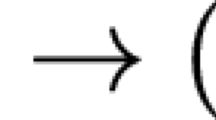Abstract
Computationalism, a specie of functionalism, posits that a mental state like pain is realized by a ‘core’ computational state within a particular causal network of such states. This entails that what is realized by the core state is contingent on events remote in space and time, which puts computationalism at odds with the locality principle of physics. If computationalism is amended to respect locality, then it posits that a type of phenomenal experience is determined by a single type of computational state. But a computational state, considered by itself, is of no determinate type—it has no particular symbolic content, since it could be embedded in any of an infinite number of algorithms. Hence, if locality is respected, then the type of experience that is realized by a computational state, or whether any experience at all is realized, is under-determined by the computational nature of the state. Accordingly, Block’s absent and inverted qualia arguments against functionalism find support in the locality principle of physics. If computationalism denies locality to avoid this problem, then it cannot be considered a physicalist theory since it would entail a commitment to phenomena, like teleological causation and action-at-a-distance, that have long been rejected by modern science. The remaining theoretical alternative is to accept the locality principle for macro events and deny that formal, computational operations are sufficient to realize a phenomenal mental state.
Similar content being viewed by others
References
Antony, M. (1994). Against functionalist theories of consciousness. Mind and Language, 9, 105–123.
Block, N. (1980a). Troubles with functionalism. In N. Block (Ed.), Readings in philosophy of psychology (Vol. 1, pp. 268–306). Cambridge, Mass.: Harvard University Press.
Block, N. (1980b). What is functionalism. In N. Block (Ed.), Readings in philosophy of psychology (Vol. 1, pp. 171–185). Cambridge, Mass.: Harvard University Press.
Copeland, J. (2002). “The church-turing thesis”. In E. Zalta (ed.), The stanford encyclopedia of philosophy (Fall 2002 Edition), http://plato.stanford.edu/.
Dampier, W. (1936). From Aristotle to Galileo. In J. Needham & W. Pagel (Eds.), Background to modern science. New York: Macmillan and Company.
Dennett, D. (1997). Quining qualia. In N. Block, O. Flanagan, & G. Güzeldere (Eds.), The nature of consciousness (pp. 619–642). Cambridge, Mass.: MIT Press.
Feynman, R. (1963). The feynman lectures on physics. New York: Addison-Wesley.
Francescotti, R. (1999). Mere cambridge properties. American Philosophical Quarterly, 36, 295–308.
Geach, P. (1969). God and the soul. London: Routledge & Kegan Paul.
Healey, R. (1999). Holism and nonseparability in physics. In E. Zalta (ed.), The stanford encyclopedia of philosophy (Winter 2004 Edition), http://plato.stanford.edu/.
Kim, J. (1973). “Causation, nomic subsumption and the concept of event”. Journal of Philosophy, LXX(8), 217–235.
Kim, J. (1998). Mind in a physical world. Cambridge, Mass.: MIT Press.
Kripke, S. (1972). Naming and necessity. Cambridge, Mass.: Harvard University Press.
Lewis, D. (1980). Psychophysical and theoretical identifications. In N. Block (Ed.), Readings in philosophy of psychology (Vol. 1, pp. 207–215). Cambridge, Mass.: Harvard University Press.
Lewis, D. (1999). New work for a theory of universals. In J. Kim & E. Sosa (Eds.), Metaphysics: An anthology (pp. 209–222). Malden, Mass.: Blackwell.
Maudlin, T. (1989). Computation and consciousness. The Journal of Philosophy, 48, 407–432.
Maudlin, T. (1994). Quantum non-locality and relativity. Cambridge, Mass.: Blackwell.
Putnam, H. (1975). The nature of mental states. In N. Block (Ed.), Readings in philosophy of psychology (Vol. 1, pp. 223–231). Cambridge, Mass.: Harvard University Press.
Quine, W. (1960). Word and object. Cambridge, Mass.: MIT Press.
Rey, G. (1997). Contemporary philosophy of mind. Cambridge, Mass.: Blackwell.
Shoemaker, S. (1981). Some varieties of functionalism. Philosophical Topics, 12, 93–120.
Shoemaker, S. (1991). Functionalism and qualia. In D. Rosenthal (Ed.), The nature of mind (pp. 395–407). Oxford: Oxford University Press.
Taylor, R. (1966). Action and purpose. Englewood Cliffs, N.J.: Prentice-Hall.
Turing, A. M. (1936). On Computable numbers, with an application to the entscheidungs problem. Proceedings of the London Mathematical Society, Series 2, 42 (1936–37), 230–265.
Author information
Authors and Affiliations
Corresponding author
Rights and permissions
About this article
Cite this article
Longinotti, D. Computationalism and the Locality Principle. Minds & Machines 19, 495–506 (2009). https://doi.org/10.1007/s11023-009-9172-4
Published:
Issue Date:
DOI: https://doi.org/10.1007/s11023-009-9172-4




